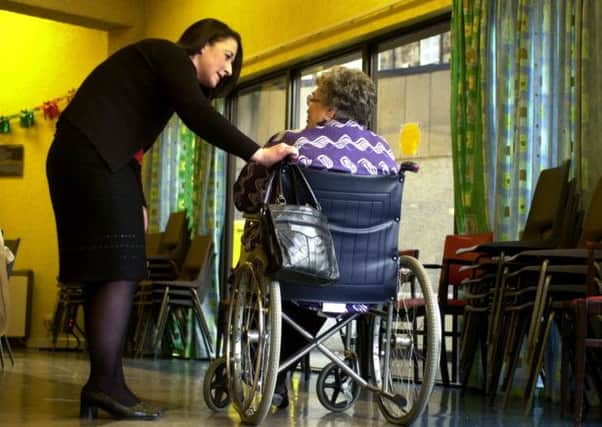New project aims to improve care for elderly Scots


The project, which has been tested in four health boards, involved identifying and assessing frail patients quickly so they can be given specialist care and rehabilitation.
It has led to a reduction in patients being admitted or readmitted to hospital, as well as drops in the length of time they have to stay in hospital and reduced mortality rates.
Advertisement
Hide AdAdvertisement
Hide AdHealthcare Improvement Scotland (HIS), which has led the initiative, said it will now share what has been learnt by the test hospitals with others across the country to improve the care of frail, elderly patients.
Figures show that Scotland’s population is ageing, and by 2035 over-65s will account for over 30 per cent of people.
Health experts have warned that the NHS will struggle to cope with rising numbers of elderly patients with complex needs in the years ahead against a backdrop of reduced resources and dropping bed numbers.
With this in mind the Focus on Frailty project set out to look at how admissions could be managed better and care improved,
It included the development of a frailty screening tool to allow hospital staff to quickly identify patients who may have complex problems and need of specialist help.
Those identified as frail are given a comprehensive geriatric assessment (CGA), meaning their medical and psychological state is assessed and specialist plans drawn up for their treatment and follow-up care. They should then be cared for on a specialist ward, which has been shown to reduce their risk of deterioration and death.
A report - Think Frailty - published by HIS has now reported on how the areas testing this approach have done since the project was established two years ago.
It found there were positive outcomes, even when hospital beds numbers overall were reducing in many areas. In NHS Grampian, the number of acute care of the elderly beds fells from 152 to 90 between 2008 and 2013.
Advertisement
Hide AdAdvertisement
Hide AdBut after a specialist geriatric assessment unit was set up at Aberdeen Royal Infirmary, the average length of stay for elderly patients fell from over 22 days to eight, with increases in those discharged within 48 hours.
They also saw mortality rates drop from 15.4 per cent to 10.3.
In NHS Lanarkshire, where staff committed to carrying out CGAs within 24 hours of admission to hospital, overall admissions among patients over 75 fell by 20 per cent over three years.
And in NHS Lothian staff achieved a reduction in time taken for patients to be identified as frail and referred to the Elderly Care Assessment Team from 38 hours to two hours in the space of three months after improvements to screening were introduced.
An analysis of improvements in the assessment of frail patients in NHS Ayrshire and Arran also found that costs could be reduced significantly due to reduced hospital stays and fewer admissions.
Penny Bond, from the HIS Older People In Acute Care (OPAC) team, said: “Frailty is complex but the early evidence from our work tells us that when frail older people are identified rapidly and have a comprehensive assessment process carried out, outcomes can be improved.
“The project was initially set up with the objective of improving care for older people in acute care and the work that the teams across Scotland have undertaken highlights significant improvements for frail older people coming into hospital.
“These outcomes include reduction in admissions and re-admissions to hospital, reduction in length of stay and reduction in discharge to care homes.”
Advertisement
Hide AdAdvertisement
Hide AdAn Age Scotland spokeswoman said: “This is exactly the sort of innovative approach we need to see the NHS taking in relation to our older population.
“Identifying those with needs early and taking preventative approaches will be vital as the proportion of older people in our population increases.
“Nobody should end up in hospital if it can be avoided. However, the fact that this project has been able to cut admissions shows some people currently are. We would want to see the spread of such good practice across the NHS being prioritised.”